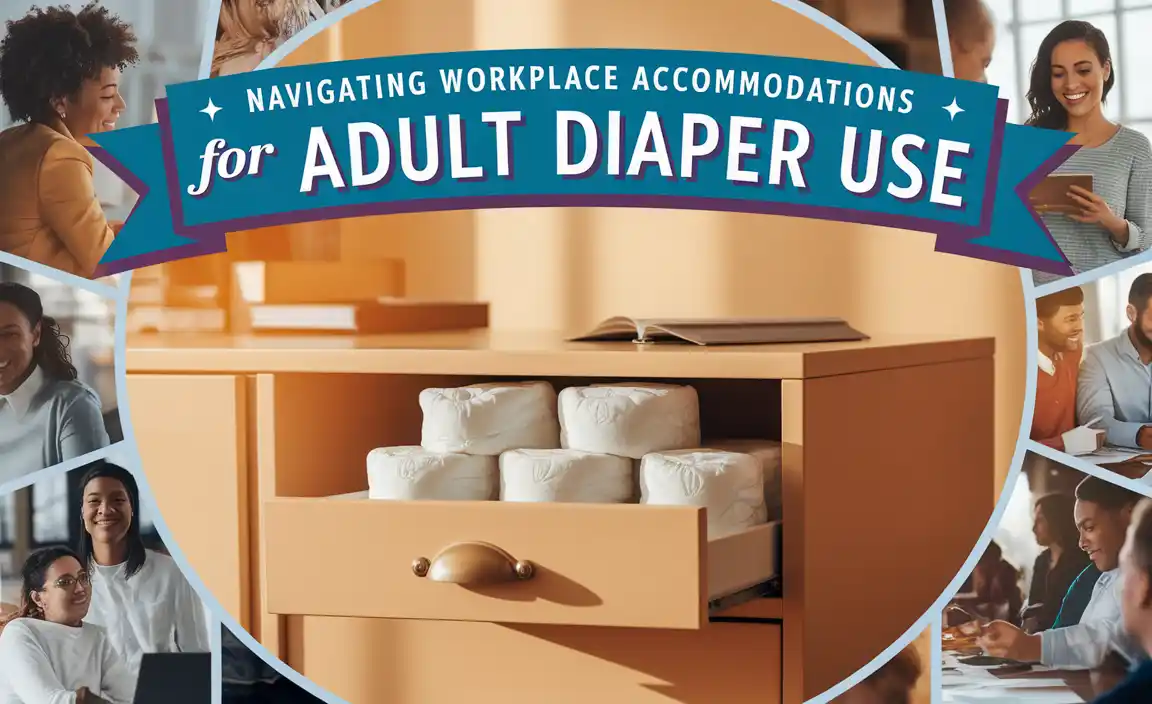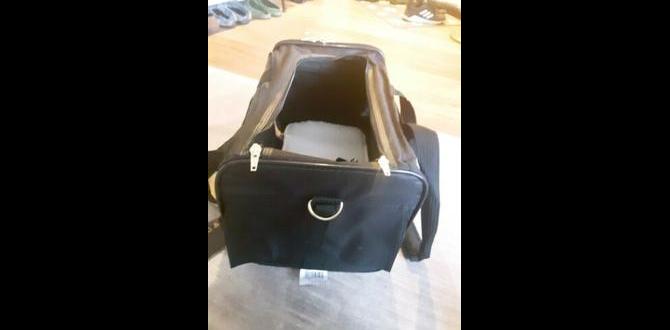Dealing with adult incontinence can be tough, stressful, and not to mention embarrassing. According to the National Association for Continence, millions of adults in the United States experience some form of incontinence.
As more people openly discuss and advocate for the rights and needs of individuals with disabilities, there is an increasing need for proper accommodations in the workplace, especially for adult diaper use. Most people with disabilities or medical conditions that require the use of adult diapers face a lot of anxiety and uncertainty around discussing the need for these accommodations with employers, supervisors, and colleagues.
However, it is essential to know that as an employee, you have a right to ask for accommodations at your workplace. We will discuss what navigate workplace accommodations for adult diaper use are, why they are needed, and what steps an employee can take to ask for accommodations. We’ll provide five tips for navigating this process and ensuring that your needs are met in the workplace, helping you to improve your overall quality of life.

5 Tips For Navigating Workplace Accommodation For Adult Diaper Use
Navigating the workplace can be a challenging experience for adult diaper users. However, you can ensure meeting your needs while maintaining privacy. It starts with open communication with your boss or the human resources department.
Your company’s disability policy should also guide the types of accommodations and support available for individuals who require adult diapers. Adult diaper users should be aware of their rights and expect to provide documentation of their disability when asked.
You may also need to answer questions about your disability and how it affects your work. By following these five tips, you will better equip yourself to navigate workplace accommodations for adult diaper use confidently and easily.
1. Talk To Your Supervisor
It is important to understand that workplace accommodations for adult diaper use are not always an option. Often, managers must make these decisions on a case-by-case basis, depending on the employee’s specific needs.
However, discussing your needs with your supervisor or human resources (HR) department can be beneficial. They may have additional resources to help you access appropriate accommodations at work. Consider discussing your situation and expectations upfront.
This will allow your employer and you to work together to determine what is best for you. They will know what type of support you need and can alert you if any changes are being made to accommodate your needs. This can help ensure that you have the necessary support at work and can continue to do your job effectively and efficiently.
2. Create A Documented Plan
An employer who documents a plan can ensure that they take all necessary steps to accommodate the needs of an adult diaper user at work. You can create it using various methods, such as creating a spreadsheet with information about the employee’s situation and updating it regularly.
And documenting any actions taken. remember it is important to keep the plan up-to-date and current, as situations may change over time. One should also tailor it to suit the specific needs of the individual and include any relevant details, such as where the individual can obtain additional assistance or supplies.
A documented plan can be a valuable tool in helping an individual understand their rights and how to seek accommodations fairly and on time. It will help them gain confidence in their abilities to manage their special circumstances at work and provide them with resources if needed. Creating a documented plan can greatly enhance an individual’s well-being while providing safety and support in the workplace.
3. Seek Professional Advice
When navigating the workplace and looking for accommodations for diaper use, many people may not know where to start, so it is essential to seek professional advice and assistance. Your doctor or physical therapist can assist you in identifying any medical issues that may arise due to your diaper use.
They can also help you create a plan for managing your symptoms at work. Working with an attorney with experience in workplace litigation or discrimination law is also important. They can help you understand your legal rights and advise you on taking the appropriate steps forward.
The best way to navigate the workplace and find accommodations for diaper use is by staying informed about current laws and trends in the industry and what companies are doing to accommodate diaper users.
4. Make A Request For Accommodation
To request workplace accommodation for adult diaper use, first, determine if the company has a policy regarding adult diaper use. If not, ask for one. Next, write a letter to the human resources department or your supervisor requesting that they make an accommodation for adult diaper use.
It can be as simple as providing a sign-off sheet or changing a desk/chair that is large enough to accommodate adult diapers. Finally, follow up on your request by email or in person and let them know how it went.
Your efforts will help you get the proper support you need at work and prevent potential issues with co-workers or bosses. Navigating workplace accommodations for adult diaper use can be challenging, so don’t be afraid to ask for help! Remember that being open about your needs and seeking professional support can help you feel more confident about wearing adult diapers at work.
5. Monitoring The Progress Of Workplace Accommodations
Monitoring workplace accommodations for adult diaper use can help ensure that people with disabilities receive the appropriate workplace support. It involves tracking how people with a disability are progressing through seeking workplace accommodations, such as changing their schedule or working from home, and making adjustments as needed.
This ensures that we meet the person’s needs and remove any potential barriers in the workplace. It can also provide valuable information on how other people with disabilities are treated in the workplace. Which can be useful in developing policies, training materials, or other resources. Employers can avoid potential pitfalls by monitoring workplace accommodations for adult diaper use and ensure everyone is treated fairly and equitably.
Definition Of Workplace Accommodations For Adult Diaper Use
Workplace accommodations for adult diaper use are necessary for individuals who require them. These accommodations may fall under the category of reasonable accommodations for employees with disabilities. Employers must provide reasonable accommodations that enable employees with disabilities to perform essential functions.
Including modifications to bathroom facilities or providing extended time to use the facilities. Employers cannot impose unreasonable restrictions on restroom or bathroom use that prevent an individual from performing essential job functions.
Individuals may need to disclose their need for accommodations related to adult diaper use. And employers are responsible for providing necessary accommodations. It is important to note that accommodations for adult diaper use may be similar to those provided for students with disabilities.
What Should An Employee Do If They Need Workplace Accommodations For Adult Diaper Use?
If you need workplace accommodations for adult diaper use, your employer must engage in an interactive process to find a reasonable accommodation that ensures equal opportunity. Employers make modifications to the workplace that accommodate disabilities, called reasonable accommodations.
It’s important to note that inappropriate behavior can result in refusing the accommodation. There are legal requirements for reasonable adjustments to practices, policies, and procedures for individuals with disabilities. Accommodations provide a level playing field, not an unfair advantage. If you need workplace accommodations for adult diaper use, talk to your employer about your needs and work together to find a solution that works for everyone.
What Are The Requirements For Making Accommodations For Adult Diaper Use?
Accommodations for adult diaper use in the workplace are necessary for individuals with a disability that requires them. Postsecondary institutions are responsible for making necessary accommodations after an adult with a disability discloses their need. Auditory processing disorders may require specific accommodations for diaper use.
Childcare centers must also comply with the ADA, which includes providing appropriate accommodations for children with disabilities. The specific accommodations required for adults with the need for adult diaper use. Can vary from person to person, depending on their individual needs.
Lists of accommodations for individuals with disabilities are available during IEP meetings. It’s essential to consult with HR to identify the required accommodations for adult diaper use. In the workplace, as different areas of the law may impact such requests. These accommodations can include accessible restrooms, hygiene item storage, or flexible work schedules.
Why Adult Diapers Are Needed In The Workplace
Incontinence is a common condition affecting many adults. For those with incontinence, adult diapers play an essential role in managing any potential accidents in the workplace. People prefer incontinence underwear because it fits similarly to regular underwear. And some brands have wetness indicators, making changes more manageable.
The use of these products allows individuals to continue with their daily activities without any interruption. It’s important to note that institutions are not obligated to provide personal services for individual academic activities. Personal attendants and devices are the responsibility of the individual with a disability.
Postsecondary institutions are not required to make accommodations for incontinence, but requesting them is possible. We ship adult incontinence products discreetly for privacy purposes.
Conclusion
Navigating workplace accommodations for adult diaper use can be challenging, but it’s important to know that employees have legal rights to accommodation. Employers must provide reasonable accommodations to individuals with disabilities unless it creates an undue burden.
Communication is key when it comes to discussing workplace accommodations. If you need accommodations for adult diaper use, request them from your employer and provide the necessary medical information.
It’s important to recognize that adult diaper use is a common and valid medical issue that needs to be addressed in the workplace as a necessary accommodation. Employees and employers must work together to create a respectful and supportive environment accommodating adult diaper use.
As an employee, you can request workplace accommodations that meet your needs. Our 5 tips for navigating workplace accommodations for adult diaper use can be helpful to ensure that you receive the necessary support. Don’t hesitate to speak up and advocate for yourself.
Frequently Asked Questions
[rank_math_rich_snippet id=”s-b1b524f7-c8fb-4b26-a314-92266291de12″]








